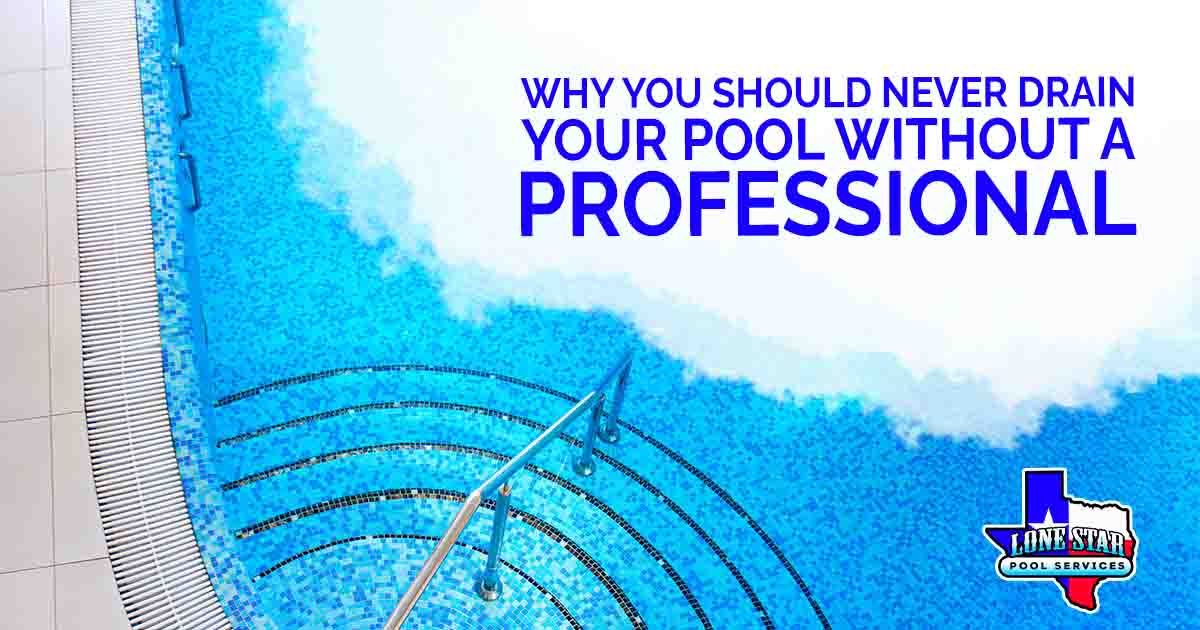Draining a swimming pool may seem like a simple maintenance task, but doing it without professional help can result in severe damage. Many homeowners are unaware of the risks of improper pool drainage, including structural failure, shifting soil, and increased hydrostatic pressure. These risks can compromise not only the pool itself but also the surrounding property. Professional pool drainage is necessary for safe and effective water removal. Lone Star Pool Services helps pool owners avoid costly damage by offering expert assessment and drainage solutions.
The Danger of Hydrostatic Pressure
Hydrostatic pressure refers to the force exerted by groundwater beneath the pool. When a pool is complete, the water inside balances that external pressure. Draining the pool removes that counterweight, leaving the pool shell vulnerable to upward pressure from below. This can result in the pool structure lifting, cracking, or shifting out of place. This type of damage is often irreversible and expensive to repair.
Most residential pools are built in areas with varying groundwater levels. Without the proper equipment and site evaluation, it is impossible to predict how strong the hydrostatic pressure will be. Licensed professionals, such as those at Lone Star Pool Services, are trained to identify risk levels and use hydrostatic relief valves when necessary. These valves allow groundwater to enter the pool during drainage, equalizing pressure and preventing structural damage.
Attempting to drain a pool without addressing hydrostatic pressure is a significant risk. Homeowners who take this step on their own often face cracked shells, popped pools, and severe repair costs. To avoid this, professional pool drainage should always be the standard procedure.
Soil Shifting and Foundation Instability
When a pool is drained, the weight of the water that once helped stabilize the surrounding soil is removed. In regions like Texas, where soil conditions vary and often contain high levels of clay, this change can lead to soil shifting. Clay soil expands when wet and contracts when dry. A sudden change in moisture levels—such as after draining a pool—can cause the ground to move unevenly.
This soil movement may lead to serious structural issues around the pool area. These include cracks in the pool deck, misaligned plumbing lines, and even damage to the foundations of nearby structures. Once the soil begins to shift, it can affect more than just the pool—it can create problems throughout the surrounding property.
Professional pool drainage services account for these variables. Lone Star Pool Services conducts a site-specific evaluation to determine how the soil will likely react to water removal. Based on this analysis, technicians may adjust the drainage process to reduce ground disturbance and prevent foundation instability.
Uncontrolled soil shifting is one of the most overlooked dangers of draining a pool without a professional. It often results in repair costs that far exceed hiring a trained expert from the beginning. Pool owners should never attempt to drain a pool without understanding the condition and behavior of the surrounding soil.
Surface and Material Damage
Draining a pool exposes interior surfaces to air, sunlight, and temperature changes. This sudden exposure can cause damage to plaster, vinyl liners, tiles, and fiberglass shells. Without the protective layer of water, materials can dry out, crack, or warp. This surface damage is common when owners attempt to drain the pool without professional supervision.
The risk is higher in older pools. Tile adhesive may weaken, leading to tile separation or shifting. Vinyl liners may shrink or become brittle, especially in warm, dry conditions. Plaster surfaces are vulnerable to cracking and discoloration if not kept consistently hydrated.
Professional pool drainage includes planning around environmental factors. Lone Star Pool Services schedules drainage during safe weather conditions and uses methods to minimize the pool’s exposure to harmful elements. Partial drainage or alternative treatments may be used to avoid complete water removal when surface integrity is at risk.
Surface damage caused by DIY pool draining is often irreversible and can lead to complete resurfacing or replacement. By using professional pool drainage services, homeowners can protect their pool structure and extend the lifespan of interior materials.
Environmental and Regulatory Compliance
Draining a pool involves more than just removing water; it also involves properly disposing of chemically treated water. Pool water often contains chlorine, algaecides, stabilizers, and other chemicals that can harm the environment if released improperly. Discharging this water into storm drains, yards, or public areas can contaminate local ecosystems and violate municipal codes.
Many cities and counties in Texas have specific regulations regarding where and how pool water can be discharged. Failing to comply with these rules can lead to fines or penalties. Homeowners who attempt to drain a pool may be unaware of these requirements, putting themselves at legal and financial risk.
Professional pool drainage services ensure that all work complies with local environmental regulations. Lone Star Pool Services manages the entire process, from permitting (if required) to safe discharge practices. Water is filtered, neutralized, or diverted according to approved procedures to avoid environmental harm.
A licensed professional protects homeowners from liability and ensures that pool water is handled safely. Draining a pool without a professional may lead to unintended legal consequences and environmental damage—both of which can be avoided with expert help.
When to Drain a Pool
While draining a pool is risky without professional guidance, there are situations where it becomes necessary. These include:
- High Total Dissolved Solids (TDS): Pool water accumulates minerals and chemicals over time that cannot be removed through regular filtration.
- Persistent algae growth: In severe cases, draining may be the only way to fully clean and sanitize the pool.
- Structural or resurfacing: Certain repairs cannot be done while the pool is complete.
- Chemical imbalance: If chemical levels are dangerously high and cannot be corrected, draining may be required to restore safe conditions.
Even in these cases, draining should never be attempted without expert evaluation. A licensed technician will determine whether partial or complete drainage is appropriate and whether additional precautions are needed based on pool type, location, and soil conditions.
Lone Star Pool Services performs a detailed assessment before any drainage procedure. This includes checking groundwater levels, soil composition, structural conditions, and local regulations. Homeowners receive a customized plan that ensures the pool is drained safely and legally, minimizing risk to the pool and surrounding property.
Knowing when—and how—to drain a pool safely is a task best left to professionals. Without expert input, what begins as a routine maintenance project can quickly turn into a costly problem.
Why Professional Pool Drainage Is the Smart Choice
Draining a pool may seem simple, but the risks are significant. Improper drainage can lead to structural damage from hydrostatic pressure, soil shifting that destabilizes the pool and nearby structures, surface material breakdown, and violations of environmental regulations. These dangers often result in repair costs far greater than the price of hiring a professional.
Lone Star Pool Services provides expert pool drainage for homeowners who value their investment’s safety, compliance, and long-term protection. With thorough site evaluations, regulatory compliance, and trained technicians, Lone Star ensures each drainage project is done correctly from start to finish.
Pool owners should never attempt to drain a pool on their own. The risk to property and personal liability is too high. When it’s time to drain a pool—whether for repairs, cleaning, or water replacement—trust Lone Star Pool Services for professional guidance and safe results.
Protect Your Pool—Contact Lone Star Pool Services Today
Draining a pool without professional help can lead to costly and irreversible damage. To safeguard your pool and property, trust the experts at Lone Star Pool Services. Our trained technicians provide thorough evaluations and safe, compliant pool drainage solutions tailored to your needs.
Don’t take unnecessary risks with your pool. Contact Lone Star Pool Services today at 832-928-3017 for a consultation and ensure your pool maintenance is done professionally and safely.

